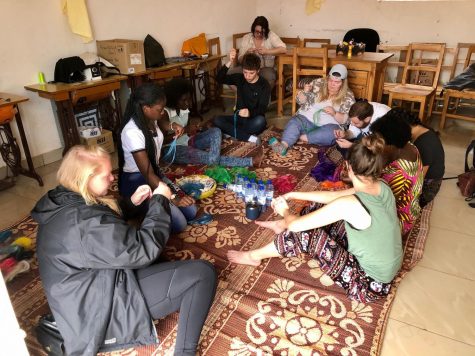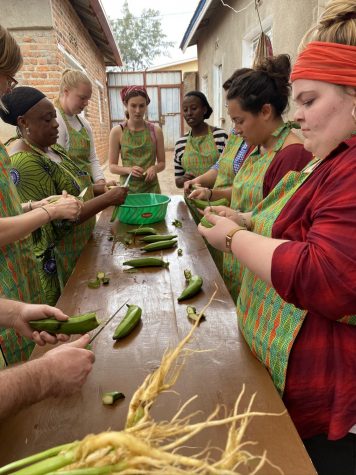Eye-opening experience
Students, professors who traveled to Rwanda in December share thoughts in town hall

Students and faculty from Allegheny College’s genocide and reconciliation course participate in a weaving course at a women’s shelter in January 2020 in Rwanda.
Allegheny College students travelled to Rwanda over winter break to study the Rwanda genocide and reconciliation of the country. Accompanied by Associate Professor of Psychology Lydia Eckstein and Associate Professor and Chair of Political Science Shanna Kirschner, students learned about the country and the turmoil its citizens have gone through in the following years.
The students and professors worked with Ageis Trust, a group whose work centers on preventing genocide, mass atrocities and crimes against humanity.
Samantha Awe, ’20, was one of the five students speaking at the town hall and began by sharing her early experiences of the trip with the audience.
“One of the first places we travelled to study the genocide was the Kigali Genocide Memorial, which is based in Kigali, the capital of Rwanda,” Awe said. “One of our tour guides… who works with Aegis Trust, the group we were there with who gave us this tour, and he himself is a survivor of the genocide, so it was interesting to see a first-hand experience with that. It was very enlightening.”
Starting in the early 1990s, the Rwandan Patriotic Front, a rebel group made up of refugees of the ethnic group Tutsi, invaded northern Rwanda, starting the Rwandan Civil War. In the years following, Rwandan President Juvenal Habyarimana was assassinated. Tutsi executions occurred the day after the assassination.
Another member of the group of students who travelled to Rwanda is Tanner Kolb, ’22, who emphasized the importance of recognizing those affected and how the trip really opened her eyes to the struggle that citizens of Rwanda went through and still are going through in the present day.
“The genocide affected everybody, nobody based on age was left out,” Kolb said. “Another thing that we saw everywhere in Rwanda was that there are memorials all over the place, and basically anywhere you go in Rwanda in some way is connected to the genocide. One thing that I think we found particularly striking and disturbing is that a lot of times during the genocide, people would go to churches as a safe place, thinking these Hutu perpetrators wouldn’t attack them if they were in a sacred or a holy place like the church, but it ended up making them easier targets.”
Along with attacks on churches, Kolb added that she learned how scattered victims and their families have become.
“Many people do not know where their loved ones are, how they died, where they died — and they are still finding bodies today,” Kolb said. “A lot of the bodies are now in respectful mass graves where we were thankfully able to pay our respects.”
The students expressed their appreciation for the trip and for the people who were affected, and emphasized how much the trip had changed them.
“A really major point that really stuck with all of us, I think, was the idea of community in Rwanda, and the question of how we can model our own lives and our own communities off of this amazing thing that Rwanda has done, recovering from the hardships and struggles they went through,” Awe said.
The students all expressed their takeaways and lessons they learned throughout this process, and acknowledged the hope that Rwanda will continue to recover from the atrocities. One large area of focus, Awe said, is on the children of Rwanda, and how important they are to the future of the country.
“Everyone is kind of aligned with the idea of hope for the future and creating a better Rwanda, and making sure that a genocide does not happen again,” Awe said. “Anywhere we went, there was the idea of hope and that the children are our future, and (that teaching) them to be a better generation is very important.”
A member of the audience, Danny Reid, ’21, talked about what he learned from hearing about the students’ experience in Rwanda following the presentation.
“Overall, it was just really enlightening for me to hear about all of their experiences in Rwanda, and especially to hear what those people are going through,” Reid said. “It really opens your eyes to the rest of the world and the things that other countries are going through, and it really makes you want to help those people in any way that you can.”

Allegheny students and faculty learn traditional Rwandan dishes in January 2020 at a local women’s shelter in Kigali.
Hannah Schaffer is a junior majoring in community and justice studies and minoring in economics and journalism in the public interest. This is Schaffer’s...





